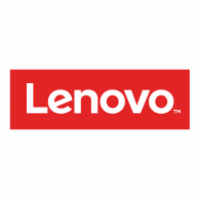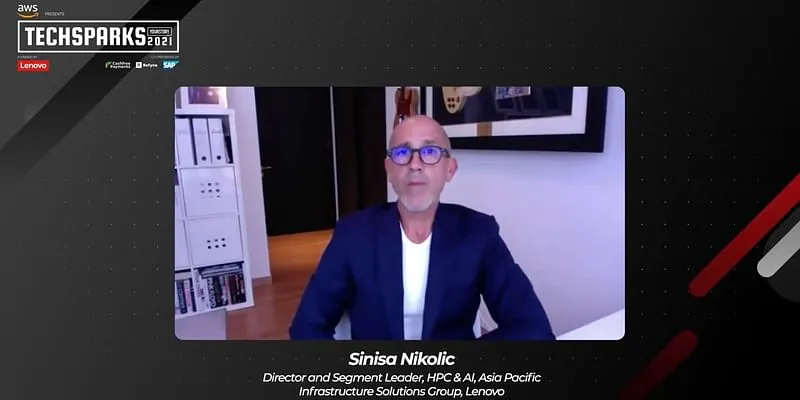
Lenovo
View Brand Publisher"AI is set to transform the future of healthcare," says Sinisa Nikolic, Director and Segment Leader, Lenovo
At TechSparks 2021, Asia’s largest and most influential startup-tech conference, Lenovo’s Sinisa Nikolic explained how technologies like AI, ML and Deep Learning can solve various health-related challenges.
In the aftermath of the COVID-19 pandemic, the healthcare industry is poised to undergo a significant transformation with the onset of technologies like Artificial Intelligence (AI), Machine Learning (ML), and High Performance Computing (HPC). According to Sinisa Nikolic, Director and Segment Leader, HPC & AI, Asia-Pacific, Infrastructure Solutions Group at Lenovo, algorithms and new-age tech is already outperforming humans in key healthcare aspects, especially diagnostics.
“With the potential to transform many aspects of patient care as well as administrative and pharmaceutical organisations, we are beginning to see the transformative power of AI and other related technologies in the healthcare industry,” said Sinisa in his keynote address at TechSparks 2021, India's most influential startup-tech conference, in a session titled ‘Healthcare of the future: How AI & HPC will power remote, mobile and virtual medicine’.
However, he is also of the opinion that AI systems will not replace human clinicians at a large scale, but rather, will augment their reference to care for the patients.
Role of AI, ML, DL in healthcare
In his address on the first day of TechSparks 2021, YourStory’s flagship startup-tech event, Sinisa pointed out that AI is not just one technology but a collection of technologies. Most of them have immediate relevance to healthcare but the specific processes and the tasks they support may vary widely.
Further in this speech, Sinisa explained the role of technologies like ML and Deep Learning (DL) in solving various health-related challenges at different levels.
“Machine Learning, as one of the common forms of AI, is a broad technique at the heart of many approaches. In healthcare, for example, the most common application is predicting which treatment protocols are likely to succeed based on learned knowledge. This can include factors like past medical history, gender, ethnicity etc to accurately diagnose the disease,” explained Sinisa.
Additionally, he also presses upon the significance of Deep Learning, which is a complex version of ML. “One of the common applications of Deep Learning in healthcare is visual identification of potential cancers. This kind of technology provides a great deal of accuracy for clinicians,” he added.

Sinisa Nikolic, Director and Segment Leader, Lenovo speaking at TechSparks 2021
Lenovo aiding in healthcare
Lenovo has developed DL-based algorithms applied in healthcare through its research e-health initiative. The algorithms analyse CT images to detect tumours, and if tumours were present, they were able to provide information such as size and location, which would further assist doctors in laying out the treatment plan.
Sinisa highlighted that technology companies like Lenovo are working closely with research institutes, hospitals, and healthcare startups across both hardware and software tech. “We are working tirelessly to decrease the time of diagnosis as well as lower the cost to address various challenges,” he added.
Adding to the contribution of Lenovo, Sinisa pointed out that in partnership with Intel, the tech giant has developed a tech solution called ‘GOAST: Genomics Optimisation and Scalability Tool’ for genomics analytics, enabling precision medicine at a much larger population scale.
Sinisa also believes that AI is extremely important for administrative activities in the healthcare industry. “Automated processes can significantly save time which can further be utilised to provide critical care to the patients,” he said.
AI cannot replace humans
Concluding his address, Sinisa Nikoloc reiterates that AI has a very important role to play in healthcare – now and in the future. With the advancement in healthcare, he predicts that most radiology and pathology imaging will be analysed by machines in the future.
However, he is assured that humans are irreplaceable. “In all aspects of healthcare, you will always need human-human contact and interaction. Humans have empathy; machines cannot replace that. AI will help us be better, stronger, and healthier.”
To log in to our virtual events platform and experience TechSparks 2021 with thousands of other startup-tech enthusiasts from around the world, join here. Don't forget to tag #TechSparks2021 when you share your experience, learnings and favourite moments from TechSparks 2021.
For a line-up of all the action-packed sessions at YourStory's flagship startup-tech conference, check out TechSparks 2021 website.

Edited by Kanishk Singh












